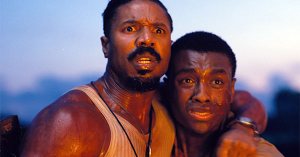10 Certified Fresh Biopics of Groundbreaking African-Americans
With Race in theaters this week, we look back at acclaimed portrayals of African-Americans on the big screen.
The remarkable life and brilliant career of Olympic gold medalist Jesse Owens gets the biopic treatment with this weekend’s Race, starring Stephan James as one of the premier athletes — and most inspiring figures — in American history. While it remains to be seen how critics receive Race, Owens’ story is definitely one that deserves the big-screen treatment, and in honor of its arrival, we’ve dedicated this feature to a fond look back at some Certified Fresh biopics focusing on African-American pioneers.

A lightning rod in life and death, activist Malcolm X was a natural fit for the biopic treatment — but it isn’t hard to understand why producer Marvin Worth had to labor through 25 years of turnarounds, screenplay revisions, changing leading men (including Richard Pryor and Eddie Murphy), and multiple directors before Malcolm X finally made its way to theaters in November of 1992. And even with Denzel Washington signed on to play the slain activist, and Spike Lee in the director’s chair, Malcolm didn’t see release without multiple controversies, a creative tug of war between Lee and Warner Bros., and a last-minute influx of cash from a group of donors that included Bill Cosby, Oprah Winfrey, and Michael Jordan. Somewhat predictably, given Malcolm X’s thorny reputation — not to mention the movie’s three-and-a-half-hour length — this wasn’t a biopic for everyone, but most of those who did see it (including 91 percent of Tomatometer critics) agreed that, for all its struggle in getting to the screen, Malcolm X was a tribute worthy of its subject. It is, wrote Vincent Canby of the New York Times, “An ambitious, tough, seriously considered biographical film that, with honor, eludes easy characterization.”

Ike Turner justifiably gets credit for his work as a rock ‘n’ roll pioneer, but his story might have been very different if he hadn’t discovered a young singer by the name of Anna Mae Bullock, christened her Tina Turner, and — at first begrudgingly — ridden her remarkable voice to worldwide stardom. As fans were later dismayed to discover, Ike had a mean streak commensurate with his musical gift, and Tina endured years of physical and emotional abuse before escaping with little more than her name — and finally being vindicated with a multi-platinum, Grammy-winning solo career. That tale of triumph was ably (albeit loosely) dramatized with this 1993 biopic starring Angela Bassett and Laurence Fishburne as Ike and Tina, with both stars earning Oscar nominations for their work. “It’s a story of pain and courage, uncommonly honest and unflinching,” wrote Roger Ebert. “The next time I hear Tina Turner singing I will listen to the song in a whole new way.”

There probably really isn’t much that could make you feel better about serving almost 20 years of prison time for a triple homicide you didn’t commit, but on the list of things that might come sort of close, having your life turned into a movie starring Denzel Washington must rank near the top. Washington toplined 1999’s The Hurricane as Rubin “Hurricane” Carter, the real-life boxer whose long incarceration for three 1966 murders inspired public protests from a number of activists (including Bob Dylan, who wrote the 1975 song “Hurricane” about Rubin). Of course, this being Hollywood, a few liberties were taken with the details of Rubin’s life, which understandably angered some of the people depicted in the film (such as boxer Joey Giardello, who sued The Hurricane‘s producers for libel) as well as a noticeable number of critics (among them the New Yorker’s David Denby, who called it “False, evasive, and factually thin — a liberal fairytale”). No matter how they felt about the film, though, pretty much everyone agreed that Washington was terrific in it — a position exemplified by the Cincinnati Enquirer’s Margaret A. McGurk, who said, “As the center of the drama, Mr. Washington more than fills the screen; he very nearly sets it on fire.”

Long before he assured a generation of Pepsi drinkers that they were chugging the right one, baby, Ray Charles carved out one of the most brilliantly groundbreaking musical careers of the modern era, fusing rock, soul, country, and anything else he felt like playing into one inimitable sound. Charles’ refusal to be defined by his blindness made him an inspiration for the physically impaired, but Taylor Hackford’s 2004 biopic Ray is no mere hagiography — this is the warts-and-all story of an artist whose once-in-a-generation talent was part of a package that included some fairly significant personal foibles, led by an outstanding, Oscar-winning performance from Jamie Foxx. Calling it “A very good film, regardless of whether or not you love Ray Charles’ music,” the Apollo Guide’s Brian Webster argued, “Even if it was a lesser film, Jamie Foxx’s performance would have made it worth watching.”

In 2007’s Talk to Me, Don Cheadle starred in a dramatization of the life and career of radio host and Emmy-winning television personality Petey Greene. Though his fame was mostly restricted to the Washington, D.C. area, Greene was an influential figure for many years, using his gift of gab and inspirational journey from prison to the airwaves as the building blocks for a career that earned him acclaim, a visit to the White House (where he famously joked he stole a spoon), and the admiration of followers such as Howard Stern. It wasn’t a huge hit, and members of Greene’s family criticized its historical inaccuracies, but as far as most critics were concerned, Talk to Me was well worth watching. As Neil Smith wrote for Total Film, “If the picture doesn’t ultimately live up to the raw vitality of Cheadle’s performance, it remains an uplifting snapshot that broadcasts its message with zero distortion. Tune in and you won’t be turned off.”

Solomon Northup was a free citizen of New York when, while traveling through Washington, D.C. in 1841, he was kidnapped and sold into slavery. His ensuing ordeal was shared by countless freemen and freed slaves who were forcibly remanded into servitude during the years surrounding the Civil War, but what makes Northup’s story unique is that after finally winning his freedom, he penned a bestselling memoir about his experiences that, along with Harriet Beecher Stowe’s Uncle Tom’s Cabin, helped fuel the burgeoning abolitionist movement. More than 150 years later, director Steve McQueen dramatized Northrup’s wrenching odyssey in 12 Years a Slave — and despite the passage of time, the tale lost little of its impact, earning nearly $200 million and a stack of accolades that included a Best Picture Oscar. “If 12 Years a Slave sounds like a brutal viewing experience then you’d be right,” wrote Gail Tolley for the List. “But in eschewing sentimentality and striving for honesty in the storytelling it is also a powerful, essential drama.”

If you’ve seen one inspirational sports drama, you’ve seen ’em all — with the notable exception of 42, which dramatizes baseball great Jackie Robinson’s color barrier-shattering first season with the Brooklyn Dodgers. Chadwick Boseman (who’d later go on to play James Brown in Get On Up the following year) brings Robinson to life, capably shouldering the burden of playing a man who faced down thousands of detractors one stadium at a time, while writer-director Brian Helgeland nimbly splits the difference between holding Robinson up as a hero and reminding viewers he was, in some ways, an ordinary man thrust into extraordinary circumstances. “For all the hate and hostility it depicts, 42 is a film about decent-hearted people,” wrote David Germain for the Associated Press. “Hate can be infectious, but so can decency. It’s the decency you’ll take away from 42.”

Director Ava DuVernay set a pretty tall order for herself when she agreed to bring a pivotal chapter from Martin Luther King, Jr.’s life to the big screen — and that job didn’t get any easier when the King estate licensed his speeches to another film project. But even deprived of its subject’s eloquent oratory, Selma manages to distill the essence of King’s struggle to effect lasting change in American race relations while facing widespread hostility or indifference across the ideological divide, thanks in no small part to David Oyelowo’s electrifying work in the central role. A historically based biopic that was also uniquely — and unfortunately — of the moment, Selma earned a Best Picture Oscar nomination and nearly universal critical acclaim from writers like Moira MacDonald of the Seattle Times, who argued, “History becomes breathtaking drama in Selma; there’s an urgent realism in the storytelling, as if we’re seeing this just in time. And indeed we are.”

How quickly things can change. To kids of the ’80s who witnessed N.W.A.’s rise to national prominence, the idea that Hollywood could ever dream of releasing a biopic about MC Ren, DJ Yella, Ice Cube, and Eazy-E would have sounded nothing short of ridiculous — yet fast-forward a couple of decades, and the confrontational quartet are recognized as one of modern hip-hop’s most important and influential acts. They received their big-screen due with 2015’s Straight Outta Compton, which traces N.W.A.’s rise and fall while injecting that by-now familiar arc with a fresh layer of sociopolitical context (and a killer soundtrack). A number of people involved with the group’s real-life story were less than pleased with the result, but as far as most critics were concerned, it still added up to an entertaining — and thought-provoking — film. Calling it “as enlightening as it is entertaining, as sobering as it is exhilarating,” the Washington Post’s Ann Hornaday wrote, “Straight Outta Compton reminds viewers not only who N.W.A. were and what they meant, but also why they mattered — and still do.”

Incredibly popular in life and massively influential in death, Bessie Smith proved to a skeptical (and still quite young) record industry that there was a huge untapped market for releases by black artists, ultimately rising to her exalted status as the Empress of the Blues (and the highest-paid black entertainer of her era). While she broke boundaries as a recording artist, her personal life was often every bit as tumultuous as her music — right up until her tragic death, the details of which were long clouded by rumor, and burial in an unmarked grave. Bessie, aired by HBO in 2015, dramatized a portion of Smith’s amazing life with Queen Latifah in the title role — and Latifah, surrounded by an excellent ensemble cast that included Michael K. Williams, Khandi Alexander, and Mike Epps, made the most of a too-rare opportunity to showcase her range. As Dorothy Rabinowitz argued for the Wall Street Journal, “It takes just the first few raunchy and emotionally searing minutes of Bessie to grasp why Queen Latifah — its star and one of its producers — viewed this story of Bessie Smith’s life and career as a labor of love, or more precisely, passion.”







